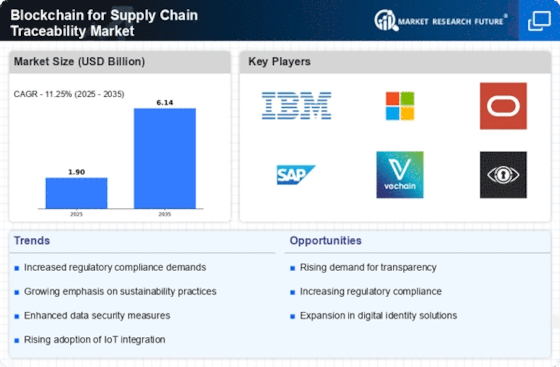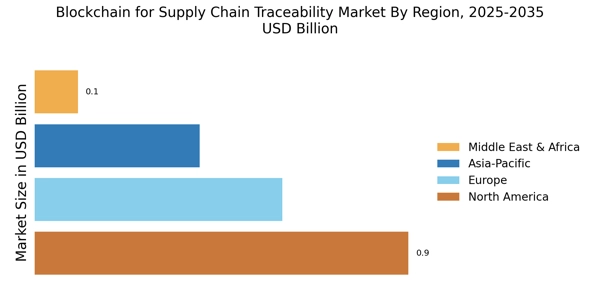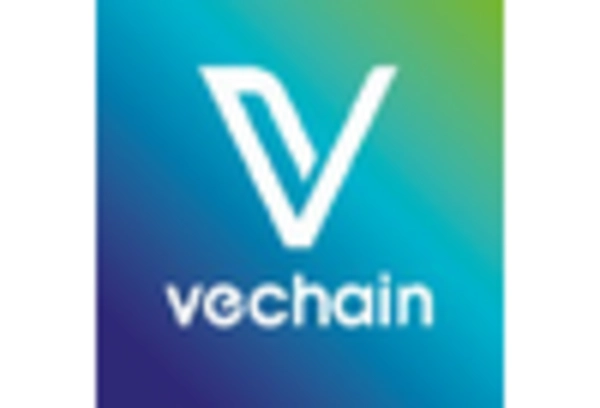Consumer Demand for Ethical Sourcing
Consumer demand for ethical sourcing is increasingly influencing the Blockchain for Supply Chain Traceability Market. As consumers become more conscious of the origins of their products, companies are compelled to provide verifiable information regarding sourcing practices. Blockchain technology enables brands to offer proof of ethical sourcing, thereby enhancing consumer trust and loyalty. This trend is particularly evident in industries such as food and fashion, where transparency regarding labor practices and environmental impact is paramount. The market is expected to grow as more companies recognize the importance of aligning their supply chains with consumer values, potentially leading to a market valuation of USD 9.6 billion by 2025.
Enhanced Traceability and Accountability
The Blockchain for Supply Chain Traceability Market is witnessing a surge in demand for enhanced traceability and accountability across various sectors. Companies are increasingly adopting blockchain technology to ensure that every transaction is recorded in an immutable ledger, thereby providing a transparent view of the supply chain. This heightened level of traceability not only helps in identifying the origin of products but also in tracking their journey through the supply chain. According to recent estimates, the market for blockchain in supply chain traceability is projected to reach USD 9.6 billion by 2025, indicating a robust growth trajectory. This trend is driven by the need for businesses to comply with stringent regulations and consumer expectations for transparency.
Cost Reduction and Efficiency Improvement
Cost reduction and efficiency improvement are pivotal drivers in the Blockchain for Supply Chain Traceability Market. By leveraging blockchain technology, organizations can streamline their operations, reduce paperwork, and minimize errors associated with traditional supply chain processes. The decentralized nature of blockchain allows for real-time data sharing among stakeholders, which can lead to significant reductions in operational costs. Reports suggest that companies implementing blockchain solutions can achieve cost savings of up to 30% in supply chain management. This efficiency not only enhances profitability but also fosters a more agile supply chain capable of responding to market demands swiftly.
Integration with Internet of Things (IoT)
The integration of blockchain technology with the Internet of Things (IoT) is emerging as a significant driver in the Blockchain for Supply Chain Traceability Market. IoT devices facilitate real-time data collection and monitoring throughout the supply chain, while blockchain ensures that this data is securely recorded and accessible. This synergy enhances visibility and traceability, allowing companies to respond proactively to disruptions and inefficiencies. The market for IoT in supply chain management is expected to grow substantially, and its convergence with blockchain technology could lead to innovative solutions that redefine supply chain operations. This integration is anticipated to play a crucial role in shaping the future landscape of supply chain traceability.
Regulatory Compliance and Risk Management
Regulatory compliance and risk management are critical factors driving the Blockchain for Supply Chain Traceability Market. Governments and regulatory bodies are increasingly mandating transparency in supply chains, particularly in sectors such as pharmaceuticals and food safety. Blockchain technology provides a robust framework for compliance, allowing companies to maintain accurate records and demonstrate adherence to regulations. This capability not only mitigates risks associated with non-compliance but also enhances the overall integrity of the supply chain. As regulatory pressures continue to mount, the adoption of blockchain solutions is likely to accelerate, further propelling market growth.


















